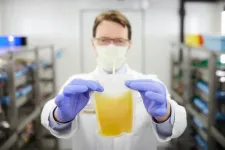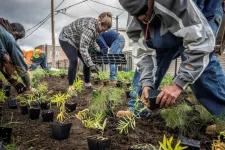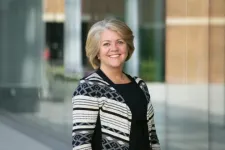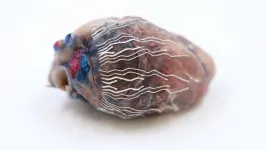Moffitt develops non-invasive approach to predict outcomes in lung cancer
New data shows computer models based on deep learning of PET/CT images can measure PD-L1 expression
2021-06-17
(Press-News.org) TAMPA, Fla. (June 17, 2021) - Tests that analyze biomarkers are used during cancer management to guide treatment and provide information about patient prognosis. These tests are often performed on tissue biopsy samples that require invasive procedures and can lead to significant side effects. In a new article published in the Journal for ImmunoTherapy of Cancer, Moffitt Cancer Center researchers show that PET/CT images can be used to measure levels of the PD-L1 biomarker of non-small cell lung cancer (NSCLC) patients in a non-invasive manner and, in turn, predict a patient's response to therapy.
Checkpoint inhibitors, drugs used to reactive the immune system by targeting the PD1/PD-L1 signaling pathway, are commonly used to treat patients with NSCLC. While this type of therapy has greatly improved patient outcomes, it only works for roughly half of this patient population. To avoid treating those who may not respond, checkpoint inhibitor therapy is often limited to patients whose surgical biopsy specimen is shown to express the PD-L1 biomarker. However, performing an invasive surgery is associated with inherent risks, and occasionally the biopsy sample is not adequate to perform diagnostic testing or the testing procedure itself may fail. Therefore, researchers are trying to develop alternative strategies to identify patients who should be treated with targeted agents such as checkpoint inhibitors.
Moffitt researchers wanted to take advantage of the capabilities of computer deep learning to develop a new framework to measure PD-L1 biomarker levels in NSCLC patients in a non-invasive manner. They chose to use features of PET/CT scan images, such as shape, size, pixel intensity and textures to train computers to measure PD-L1 expression. They developed a deep learning score to predict PD-L1 expression, and after validation through different patient cohorts were able to use their model to predict checkpoint inhibitor outcomes in NSCLC patients.
"These data demonstrate the feasibility of using an alternative non-invasive approach to predict expression of PD-L1," said Matthew Schabath, Ph.D., associate member of the Cancer Epidemiology Department. "This approach could help physicians determine optimum treatment strategies for their patients, especially when tissue samples are not available or when common testing approaches for PD-L1 fail."
"This study is important, as it is the single largest multi-institutional radiomic study population of NSCLC patients to date treated with immunotherapy to predict PD-L1 status and subsequent treatment response using PET/CT scans," said Robert Gillies, Ph.D., chair of the Department of Cancer Physiology at Moffitt. "Because images are routinely obtained and are not subject to sampling bias per se, we propose that the individualized risk assessment information provided by these analyses may be useful as a future clinical decision support tool pending larger prospective trials."
INFORMATION:
This study was supported by funds received from U.S. Public Health Service research grants (U01 CA143062 and R01 CA190105).
About Moffitt Cancer Center
Moffitt is dedicated to one lifesaving mission: to contribute to the prevention and cure of cancer. The Tampa-based facility is one of only 51 National Cancer Institute-designated Comprehensive Cancer Centers, a distinction that recognizes Moffitt's scientific excellence, multidisciplinary research, and robust training and education. Moffitt is the No. 11 cancer hospital and has been nationally ranked by U.S. News & World Report since 1999. Moffitt's expert nursing staff is recognized by the American Nurses Credentialing Center with Magnet® status, its highest distinction. With more than 7,000 team members, Moffitt has an economic impact in the state of $2.4 billion. For more information, call 1-888-MOFFITT (1-888-663-3488), visit MOFFITT.org, and follow the momentum on Facebook, Twitter, Instagram and YouTube.
ELSE PRESS RELEASES FROM THIS DATE:
2021-06-17
As pandemic restrictions begin to loosen around the country and summer temperatures rise, more people will be moving about on public rideshare electric scooters. With that comes this warning: Ride with safety.
A Henry Ford Health System study published in The Laryngoscope, shows that head and neck injuries caused by use of e-scooters have been on the rise since rideshare systems were introduced to the public in late 2017.
Kathleen Yaremchuk, M.D., Chair of the Department of Otolaryngology - Head and Neck Surgery and the study's senior author, said that a review of emergency visits in the last three years showed e-scooter injuries have increased significantly with many related to head and neck injuries. "Since e-scooters became a popular form of ...
2021-06-17
In the Name of Racial Justice: Why Bioethics Should Care about Environmental Toxins
Keisha Ray
Facilities that emit hazardous toxins, such as toxic landfills, oil refineries, and chemical plants, are disproportionately located in predominantly Black, Latinx, and Indigenous neighborhoods. Environmental injustices like these threaten just distribution of health itself. Facilities that emit environmental toxins wrongly make people's race, ethnicity, income, and neighborhood essential to who is allowed to breathe clean air and drink clean water, and thus, who is allowed to be healthy. This ...
2021-06-17
A large, retrospective, multicenter study involving Washington University School of Medicine in St. Louis indicates that convalescent plasma from recovered COVID-19 patients can dramatically improve likelihood of survival among blood cancer patients hospitalized with the virus.
The therapy involves transfusing plasma -- the pale yellow liquid in blood that is rich in antibodies -- from people who have recovered from COVID-19 into patients who have leukemia, lymphoma or other blood cancers and are hospitalized with the viral infection. The goal is to accelerate their disease-fighting response. Cancer patients may be at a higher risk of death related to COVID-19 because of their weakened immune systems.
The data, collected as part ...
2021-06-17
A new article, published as a Perspective in the journal Conservation Science and Practice, introduces a rapid assessment framework that can be used as a guide to make conservation and nature-based solutions more robust to future climate.
Climate change poses risks to conservation efforts, if practitioners assume a future climate similar to the past or present. For example, more frequent and intense disturbances, such as wildfire or drought-induced tree mortality, can threaten projects that are designed to enhance habitat for forest-dependent species and sequester carbon. Overlooking such climate-related risks can result in failed conservation investments and negative outcomes for people, biodiversity, and ecosystem integrity as well as lead to carbon-sink reversal. Drawing ...
2021-06-17
The Black Sea is an unusual body of water: below a depth of 150 metres the dissolved oxygen concentration sinks to around zero, meaning that higher life forms such as plants and animals cannot exist in these areas. At the same time, this semi-enclosed sea stores comparatively large amounts of organic carbon. A team of researchers led by Dr Gonzalo V. Gomez-Saez and Dr Jutta Niggemann from the University of Oldenburg's Institute for Chemistry and Biology of the Marine Environment (ICBM) has now presented a new hypothesis as to why organic compounds accumulate in the depths of the Black Sea - and other oxygen-depleted waters in the scientific journal Science Advances.
The researchers posit that reactions with hydrogen sulfide play an important role in stabilizing ...
2021-06-17
New Brunswick, N.J. (June 17, 2021) - Babies born by cesarean section don't have the same healthy bacteria as those born vaginally, but a Rutgers-led study for the first time finds that these natural bacteria can be restored.
The study appears in the journal Med.
The human microbiota consists of trillions of bacteria, viruses, fungi and other microorganisms - some beneficial, some harmful -- that live in and on our bodies. Women naturally provide these pioneer colonizers to their babies' sterile bodies during labor and birth, helping their immune system to develop. But antibiotics and C-sections disturb this passing of microbes and are related to increased risks of obesity, asthma and metabolic ...
2021-06-17
Woodlands along streams and rivers are an important part of California's diverse ecology. They are biodiversity hotspots, providing various ecosystem services including carbon sequestration and critical habitat for threatened and endangered species. But our land and water use have significantly impacted these ecosystems, sometimes in unexpected ways.
A team of researchers, including two at UC Santa Barbara, discovered that some riparian woodlands are benefitting from water that humans divert for our own needs. Although it seems like a boon to these ecosystems, the artificial ...
2021-06-17
SAN ANTONIO (June 17, 2021) -- Middle-aged people with depressive symptoms who carry a genetic variation called apolipoprotein (APOE) ε4 may be more at risk to develop tau protein accumulations in the brain's emotion- and memory-controlling regions, a new study by researchers from The University of Texas Health Science Center at San Antonio (UT Health San Antonio) and collaborating institutions suggests.
The Journal of Alzheimer's Disease published the findings in its June 2021 print issue. The research is based on depression assessments and positron emission tomography (PET) imaging conducted among 201 participants in the multigenerational Framingham Heart Study. The mean age of these participants was 53.
Decades before diagnosis
PET scans typically are conducted ...
2021-06-17
LOS ALAMOS, N.M., June 17, 2021 -- A research team from Los Alamos National Laboratory and Purdue University have developed bio-inks for biosensors that could help localize critical regions in tissues and organs during surgical operations.
"The ink used in the biosensors is biocompatible and provides a user-friendly design with excellent workable time frames of more than one day," said Kwan-Soo Lee, of Los Alamos' Chemical Diagnostics and Engineering group.
The new biosensors allow for simultaneous recording and imaging of tissues and organs during surgical procedures.
"Simultaneous recording and imaging could be useful during heart surgery in localizing critical regions and guiding surgical interventions such as a procedure for restoring normal ...
2021-06-17
Nanodecoys made from human lung spheroid cells (LSCs) can bind to and neutralize SARS-CoV-2, promoting viral clearance and reducing lung injury in a macaque model of COVID-19. By mimicking the receptor that the virus binds to rather than targeting the virus itself, nanodecoy therapy could remain effective against emerging variants of the virus.
SARS-CoV-2 enters a cell when its spike protein binds to the angiotensin-converting enzyme 2 (ACE2) receptor on the cell's surface. LSCs - a natural mixture of lung epithelial stem cells and mesenchymal cells - also express ACE2, making them a perfect vehicle ...
LAST 30 PRESS RELEASES:
[Press-News.org] Moffitt develops non-invasive approach to predict outcomes in lung cancer
New data shows computer models based on deep learning of PET/CT images can measure PD-L1 expression






